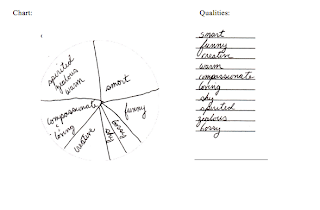Are you too humble?
It's one thing to be humble - to be modest and give a low estimation of your value.
It's another thing to devalue yourself, underestimate yourself or be too quick to point out perceived faults and flaws.
How do you talk to yourself or about yourself?
If you only define yourself by what you look like, or put yourself down for perceived deficits, you're missing the whole picture. When you appreciate all your qualities, your view of yourself will change.
A pie chart is a great way of seeing the whole you.
List the qualities about yourself that have nothing to do with your physicality. Include things you like as well as things you don't like about yourself: e.g., smart, funny, creative, warm, compassionate, loving, shy, spirited, zealous, bossy.
Then divide the pie below to represent each of these qualities.
Follow the example and list the qualities about yourself in the following categories:
Emotional Intellectual Relational Other (not physical)
______________ ______________ ______________ _____________
______________ ______________ ______________ _____________
______________ ______________ ______________ _____________
______________ ______________ ______________ _____________
______________ ______________ ______________ _____________
______________ ______________ ______________ _____________
______________ ______________ ______________ _____________
Now, divide up the qualities on the pie chart below.
How does it feel to look at this chart? What do you notice about this perspective of yourself? What surprises you? Is your mind conflicted between acceptance and indifference? Why?
Having a more realistic self-concept facilitates self-acceptance. When you appreciate who you are as a person, you feel better about yourself. And when you feel better, you’re less likely to turn to (or from) food for comfort or distraction from uncomfortable thoughts and emotions about yourself.



